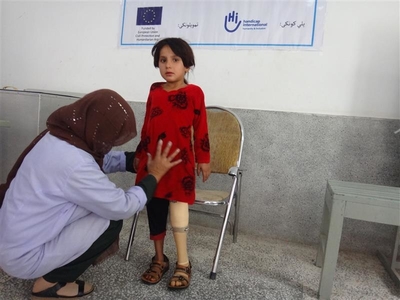Due to a collapsing economy, drought and consequences following years of war, the humanitarian context has significantly deteriorated. Since violence ended last August, people have been flocking to the Kandahar rehabilitation centre.
What kinds of people do you receive at the rehabilitation centre in Kandahar?
 The vast majority of people are victims of the war and of explosive weapons. Last November, I met an 8-year old girl from Zabul Province, which neighbours Kandahar. A mortar bomb hit her house while she was playing at home with her cousins. She was badly injured in the blast, and she was taken to several hospitals for treatment. Her father and family live on very little income, unable to afford the cost of transportation to Kandahar.
The vast majority of people are victims of the war and of explosive weapons. Last November, I met an 8-year old girl from Zabul Province, which neighbours Kandahar. A mortar bomb hit her house while she was playing at home with her cousins. She was badly injured in the blast, and she was taken to several hospitals for treatment. Her father and family live on very little income, unable to afford the cost of transportation to Kandahar.
After many difficult months, her family finally managed to transport her to Kandahar where she received treatment. Unfortunately, by then, her left leg had to be amputated. Humanity & Inclusion (HI)’s team at the centre worked with the young girl for several weeks as she recovered from the operation. We provided rehabilitation sessions to increase her mobility, strength and balance. Finally, when she was ready, measurements were taken and she was given a prosthetic leg.
The importance of the HI Kandahar rehabilitation centre
The rehabilitation needs are immense. People come to the centre every day, sometimes from very far away. For some families, the journey to the centre takes an entire day, as there are only two rehabilitation centres that serve the south of the country.
Since August 2021, we have seen a major increase in patient numbers. More people have been able to access the centre since the fighting, roadblocks and strict security measures have ended. Now, we receive more than 100 people a week at the Kandahar centre.
How strong is the connection between disability and explosives, landmines and other remnants of war?
Based on our data from the centre, the majority of the people have acquired disabilities following contact with explosives, landmines and other remnants of war. In Afghanistan, the prevalence of disability is very high: 80% of the Afghan population has some form of disability due to the presence of mines, explosive remnants of war, armed conflicts and limited access to health and nutrition services.
What is the general situation in Afghanistan six months after the Taliban seized power?
More than half the population is in need of humanitarian assistance. People are really struggling with poverty, displacement, drought, and the ongoing risks associated with improvised explosive devices. The country’s health system is overwhelmed and the economy is collapsing. Many struggle just to get food. With no more cash in circulation, civil servants have not been paid for months and people are unable to buy goods.
What is HI’s response to this situation?
HI provides rehabilitation care as the medical system in the country is unable to meet the current demand. As physical therapy services are scarce, we have a national plan to train more than 120 physiotherapists over the course of a 3-year curriculum. HI also provides psychosocial support to many people suffering from stress and anxiety since there are very few mental health services in the country. We also conduct risk education sessions, as the presence of mines and explosive remnants of war remain a daily threat to the population.
HI teams in Kunduz and Herat started providing cash assistance to support families with the lowest income. We will provide between 6 and 9 allowances of 200 dollars to the most vulnerable people, targeting 1600 families. This financial support will enable them to buy food and access basic services like medical care.

 The vast majority of people are victims of the war and of explosive weapons. Last November, I met an 8-year old girl from Zabul Province, which neighbours Kandahar. A mortar bomb hit her house while she was playing at home with her cousins. She was badly injured in the blast, and she was taken to several hospitals for treatment. Her father and family live on very little income, unable to afford the cost of transportation to Kandahar.
The vast majority of people are victims of the war and of explosive weapons. Last November, I met an 8-year old girl from Zabul Province, which neighbours Kandahar. A mortar bomb hit her house while she was playing at home with her cousins. She was badly injured in the blast, and she was taken to several hospitals for treatment. Her father and family live on very little income, unable to afford the cost of transportation to Kandahar.

